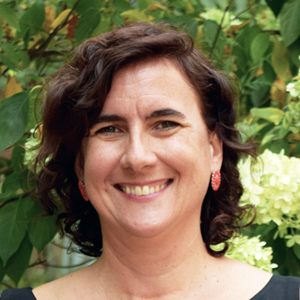For many parents, helping their children navigate and cope with stress and anxiety can be challenging on any given day. But a new study from social work researcher Melissa Lippold suggests that parents also need to be aware of how their child’s stress may impact their own health.
The study, which Lippold conducted with colleagues from Pennsylvania State University, the University of South Florida, and Oregon State University, found that the transmission of stress in families appears to flow from children to their parents and not the other way around. This latest study builds on Lippold’s previous work, which has focused on how relationships can affect physical health, including the development of diseases and stress-related physiology.

“We certainly know from the developmental literature that how kids are behaving influences the behaviors of their parents,” said Lippold, an associate professor at the UNC School of Social Work. “But what we were really interested in trying to understand is stress as a family process. We wanted to see if there are physiological effects between parents and their children, meaning how their stress response effects are related to each other.”
The study, “Daily parent-adolescent cortisol associations: Unpacking the direction of effects,” was recently published in the journal, Psychoneuroendocrinology. Lippold is among a growing number of researchers who study cortisol, also known as the “stress hormone,” which individuals produce every day. Generally, cortisol levels ebb and flow over the course of a day, rising during the morning hours before dropping to their lowest levels at night.
In their latest study, Lippold and her colleagues examined the stress hormones of children ages, 9 to 17, and their parents. The researchers initially thought they would find bidirectional linkages between parent and child cortisol. That is, parents and children would affect each other.
“But that actually wasn’t the case, which is why we were kind of excited about this paper and why it’s spurring some new directions for us,” she said. “In our study, parents physiological stress, which is marked by cortisol, didn’t predict their kids’ physiological stress the next day, but the kids affected the parents. That means there’s really this child-driven transmission of stress in the family, and it’s from the kid to the parent, which was surprising in some ways. Now, we want to know why is this happening and what does it mean? It reminds me of the old parenting saying of, ‘You’re only as happy as your unhappiest kid, or in this case, parents may be as stressed as their child.’”
Such findings have health implications, given that other research has shown that levels of cortisol are associated with, among other functions, blood sugar, blood pressure, and sleep. Moreover, overall health becomes a greater concern when individuals experience chronic stress and their cortisol levels remain high over prolonged periods of time. As stress response systems become overworked, people are at an increased risk for immune problems, mental health issues such as depression, and diseases, such as cancer and diabetes, Lippold said.
Although the study was completed before the rise of the pandemic, the results highlight the need for parents to be aware of their own stress levels right now, Lippold said.
“It’s a pandemic so it’s a stressful time for everyone and parents are being asked to do a lot, so it’s a really easy time to feel stressed and worried about your kids,” Lippold said. “Part of your job as a parent is you want to nurture and protect your child, and you want to make sure they’re getting the best. At the same time, it’s important to take care of yourself so that you can be attentive and attuned to your child but in a way that maybe isn’t going to have negative effects for you.”
Parent support groups, such as the virtual one that the School of Social Work launched last spring for faculty, staff and students, can help, she said. For Sharon Holmes Thomas, Lippold’s colleague and assistant dean for recruitment, admissions and financial aid, the group has been a lifesaver. Thomas and her husband, who also works with UNC-Chapel Hill students, have two children, and both have found life overwhelming the last few months due to juggling work from home and helping their kids adjust to remote teaching.
“That has been one of my worst fears through all of this – how our children are receiving the angst and anxiety that I’ve been feeling, which sometimes makes me feel even worse,” said Thomas. “That is one thing that many of us in our parent support group sessions have wrestled with, and many of us have shared about wanting to make sure the kids are OK.”
For Thomas and other parents, finding balance is key. The group even compiled a list of self-care activities to share, such as 45 minutes of quiet time every day, mindless TV, socially distanced coffee dates with friends and medication for anxiety if needed.
These kinds of solutions are so important for adults to consider to ensure their own well-being, Lippold added.
“The extent that parents work on their tools to stay centered and calm as they can, especially when dealing with their kids’ stress, the less likely we’ll see this transition of child stress to parents physiologically,” Lippold said.

